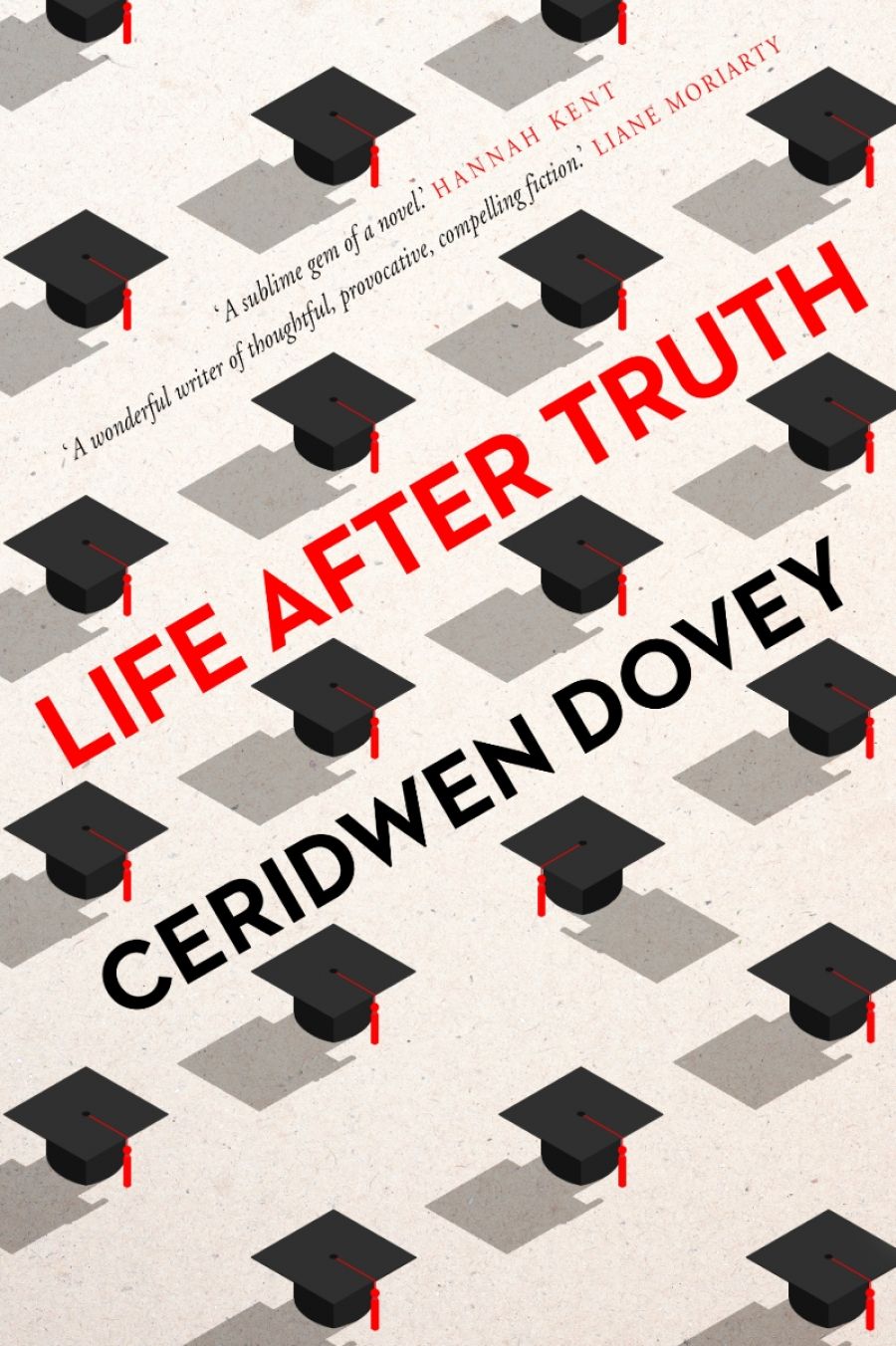
- Free Article: No
- Contents Category: Fiction
- Review Article: Yes
- Article Title: The science of happiness
- Article Subtitle: A presidential-term dream
- Online Only: No
- Custom Highlight Text:
Since the publication of her acclaimed first novel, Blood Kin (2007), Ceridwen Dovey has established herself as an intelligent author who typically probes what it means, and might mean in the future, to be human. Equally au fait with literary analysis, politics, and science, Dovey has since 2007 published several more books of fiction, two non-fiction books, and numerous essays, contributing regularly to The Monthly and The New Yorker. Now she has extended her range in fiction to a lighter mode, focusing on contemporary life and the pleasures of storytelling. Publishing in audio form has worked well in signalling Dovey’s new voice: Life After Truth was first published through the Australian and New Zealand Audible Originals program in November 2019, and her novel Once More with Feeling was released as an Audible Original in May 2020.
- Grid Image (300px * 250px):

- Book 1 Title: Life After Truth
- Book 1 Biblio: Viking, $32.99 pb, 304 pp
- Book 1 Readings Link: booktopia.kh4ffx.net/Xz1ZX
In Life After Truth, now available in print from Viking, Dovey uses the in-built drama of the graduate reunion to hothouse anxieties around impending middle age in five college friends who return to Harvard for a reunion weekend in the late spring of 2018. Revisiting the past from a changed present kindles unrealised ambitions and unresolved loves and antagonisms, as the ‘blockmates’ grapple with becoming commonplace, having been both young and special in this ‘hallowed space’, the world before them.
The novel, cleverly structured, opens with extracts from the ‘Harvard Class of 2003 – Fifteenth Anniversary Report’. The prologue that follows is bookended by an epilogue; within this, twelve chapters present the perspectives of four of the group in an alternating third-person narration. The self-penned entries in the anniversary report introduce the primary characters: Jomo, founder of a luxury jewellery company, whose father’s homeland is Tanzania; Juliet (Jules), whose minimalist entry hints at her acting fame and her wish for privacy – reflected structurally in the absence of chapters in her name; Eloise, who is married to Binx, both now ‘House Masters (Mistresses!)’ of Kirkland House, the group’s undergraduate home; Mariam, a stay-at-home ‘Mom’, whose entry suggests a new interest in her Syrian Christian roots; and her husband, Rowan, who decries the US president, Gerald Reese, as a fascist, and their country’s state as ‘calamitous’. ‘Shame on you’, Rowan vows he will say to Reese’s son and ‘Senior Adviser’, their former classmate Frederick, should he attend the reunion. He does; the discovery of Frederick’s death in the prologue, set on the dawn of the last day of the weekend, drives the narrative and sets the tone: ‘Somebody had finally taken a stand,’ thinks Mariam.
The characters’ lives unfold convincingly through memories and free-flowing thought. Jomo is troubled by his inability to propose to his beautiful girlfriend, Giselle; ‘You are 37 going on 16,’ a palm reader pronounces. Eloise has built her profession on the science of happiness and is now Professor of Hedonics, but she feels a discrepancy with the priorities of her younger, post-humanist, ‘tech guru’ wife. Rowan, now the principal of a public school in Brooklyn, struggles with his choice of principles over wealth. Mariam is occupied with the ‘daily slog of parenting’, evaluating a gamut of concerns: from the #MeToo movement to breastfeeding; from smartphones for children to ‘the rise of the filiarchy’. It is to Dovey’s credit that each character’s anxieties seem to emanate from a whole person, rather than from authorial preoccupations.
The novel’s title draws on Harvard’s motto, Veritas, meaning ‘truth’. Of the actions of the president and his son, Rowan writes, ‘we have all been forced to live in a post-Veritas world’; the spotlight appears to be on politics. Jared Kushner, now Donald Trump’s son-in-law, was Dovey’s classmate at Harvard, as was Natalie Portman; Dovey’s own fifteenth reunion inspired this novel. But this is fiction, and here the two famous characters, Frederick Reese and Juliet Hartley, act principally as dark and light archetypes against which characters might measure themselves. In being presented with the past and the future, through cohorts of older and recent graduates, the characters question what once seemed certain, and play with or challenge a surrender to ordinariness. The novel’s exploration of what constitutes happiness is central to this process, especially in an increasingly digitised, hyper-connected world. If happiness is ‘being able to foster a private self and sharing it with those you trust’, what Eloise calls ‘joyful apprehension’ also involves being prepared to take that risk; happiness and love are intimately connected.
But the characters are all hiding something. Mariam is not disclosing her newly developed religious faith to her husband; Rowan is keeping his own secrets. Eloise resists sharing with Binx her ambivalence around surrogacy and the ‘fembot in the basement’, the avatar Elly+. Jules, Eloise intuits, has had to ‘keep some part of her true self hidden, in order to survive her own fame’, while Jomo understands his famous friend as seeking ‘a bigger cause’ to which she can devote herself. And Jomo? Shakespeare’s Romeo and Juliet was the first romance he read; finding his soul mate, he believes, involves waiting for the stars to align. Juliet Hartley is a clue, but love is blind.
Dovey clearly had fun writing Life After Truth, often deploying both irony and toilet humour, but light invokes dark, and of the twin arrows in the love-god’s bow in the novel’s epigraph, ‘one is aimed at happiness, the other at life’s confusion’ (Euripides, Iphigenia in Aulis). With an Australian release on the day of the US election, future readings of this novel may highlight duality in response to the workings of history. Here’s to a happy outcome: less Romeo and Juliet, more A Midsummer Night’s Dream.


Comments powered by CComment